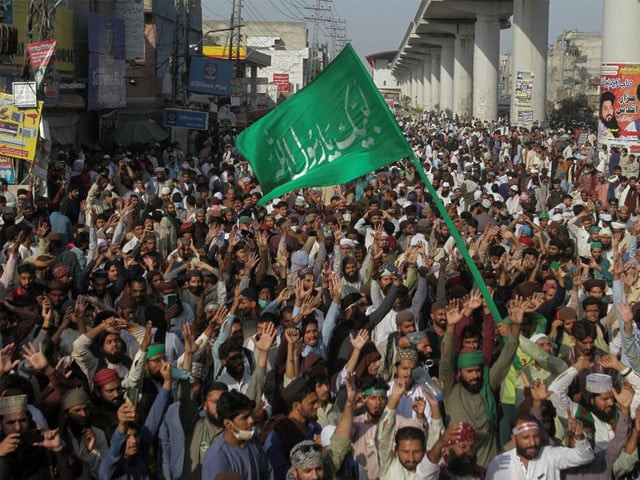Supporters of the banned Islamist political party TLP shout slogans during a protest rally in Lahore, Pakistan October 22, 2021. PHOTO: REUTERS
With the federal cabinet approving a ban on Tehreek-e-Labbaik Pakistan, the party is likely to become the 83rd political or religious organization, armed group or welfare body to be declared a banned entity in Pakistan over the past 25 years.
A ban was also imposed on the TLP in 2021 by the then ruling PTI government, but it was lifted after six months on the condition that the group refrain from violent or subversive acts.
Can TLP actually be banned?
Under Section 11-B(1) of the Anti-Terrorism Act, 1997, any group or political/religious organization found involved in criminal or terrorist activities can be declared proscribed. The process is carried out by the Ministry of the Interior with the approval of provincial governments and the National Assembly.
The story of forbidden clothes
The crackdown on extremist and sectarian organizations began in 2001 when Pakistan faced a rise in sectarian terrorism. The first groups to be banned were Lashkar-e-Jhangvi and Sipah-e-Muhammad.
In 2002, the process accelerated with bans imposed on several jihadist organizations, including Jaish-e-Muhammad, Lashkar-e-Taiba, Sipah-e-Sahaba, Tehreek-e-Jafaria Pakistan, Tehreek-e-Islami and Tehreek Nifaz Shariat-e-Muhammad, effectively suspending their activities across the country.
In 2003, further steps were taken against Al-Qaeda, Jamaat-ul-Furqan, Hizb-ut-Tahrir and Jamaat-ul-Ansar.
Rebranding of banned organizations
Several previously banned groups re-emerged under new names – Sipah-e-Sahaba became Millat-e-Islamia Pakistan, Tehreek-e-Jafaria renamed Islami Tehreek Pakistan, and Jaish-e-Muhammad re-emerged as Khuddam-ul-Islam. These renamed units were subsequently banned again by the government.
In 2006, escalating militant activity in Balochistan led to the expulsion of the Balochistan Liberation Army (BLA).
Between 2006 and 2010, the insurgency intensified, prompting the government to ban additional separatist and militant outfits, including the Baloch Republican Army (BRA), Baloch Liberation Front (BLF), Lashkar-e-Balochistan (LeB), Baloch Liberation United Front (BLUF), and Tanze Musallah Defa (BMDC).
Left to right winged banned units
Each year, new organizations are added to the list of proscribed entities based on provincial recommendations, intelligence reports, and sometimes advice from the US State Department.
Since 2000 till date, the Pakistani government has banned 82 organizations.
In 2024, Zainabiyoun Brigade (ZB), Majeed Brigade (MB) in Balochistan, Hafiz Gul Bahadur Group and Pashtun Tahafuz Movement (PTM) were the latest additions to the list of banned organizations.
Political parties have also faced restrictions since the inception of Pakistan.
The Communist Party of Pakistan (CPP), led by Sajjad Zaheer, was the first political party to be banned in 1954. Later, Sheikh Mujibur Rahman’s Awami League was banned in 1971, followed by Khan Abdul Wali Khan’s National Awami Party (NAP) in 1975.



